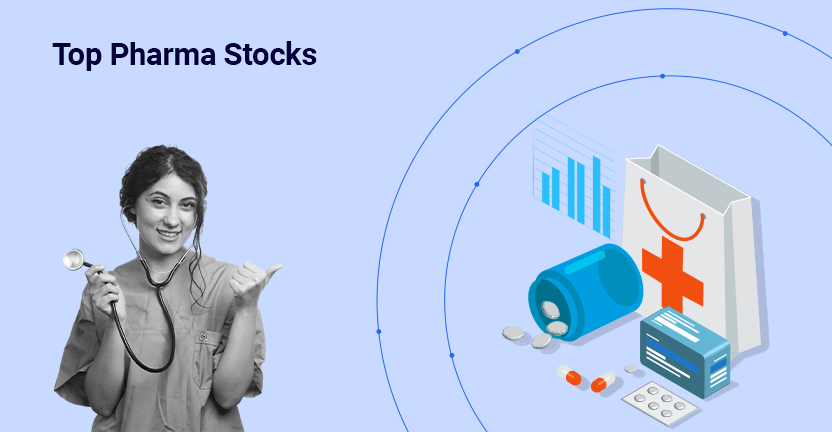The Indian stock market is full of opportunities, and the pharmaceutical sector stands out as one of the most promising areas for investment. With its continuous growth, innovation, and essential role in healthcare, investing in pharma stocks can yield both stability and significant returns.
In this blog, we’ll highlight the top pharma stocks to buy now, incorporating both current market data and essential investment strategies.
Why Invest in Pharma Stocks?
The pharmaceutical industry has proven to be a pillar of economic resilience and innovation. India is a global leader in generic drug manufacturing, accounting for a significant share of the global market. The country’s commitment to research and development (R&D), along with the rising demand for healthcare products, makes pharma stocks an attractive investment option.
Current Market Overview: Pharma Sector in India
India’s pharmaceutical sector has shown steady growth and continues to attract investors. As of 2024, the Nifty Pharma Index has gained 35%, supported by the growing need for healthcare solutions and a strong export market. This increase in market participation and interest makes it crucial to know which pharma stocks are currently performing well.
Top Performing Pharma Stocks as of January:
| Company Name | Market Cap (₹ Crore) | P/E Ratio | 5-Year CAGR (%) |
| Biocon | ₹46,823 | 32.4 | 6% |
| Gufic Bioscience | ₹4,708 | 55.4 | 49% |
| Dr Agarwals Eye Hospital Ltd | ₹3,231 | 64 | 89% |
| Aurobindo Pharma | ₹67,873 | 18.6 | 19% |
| Lincoln Pharmaceuticals Ltd | ₹1,678 | 17.4 | 31% |
Factors to Consider Before Investing in Pharma Stocks
- Regulatory Approvals and Compliance: Regulatory compliance is crucial in the pharmaceutical industry, as it ensures that products meet safety and efficacy standards set by agencies like the FDA, EMA, and India’s CDSCO. Companies with consistent approvals and a good compliance record are more reliable. Frequent regulatory issues or product recalls can lead to stock price volatility.
- Product Portfolio and Diversification: A diversified product portfolio that spans various therapeutic areas can reduce risk and increase growth potential. Companies that rely on a single drug or therapeutic area are at higher risk if competitors enter the market or if the product fails to perform.
- Global Presence and Market Reach: Companies with a robust international presence have a larger market to tap into, which can lead to higher revenue. Pharma firms that export their products or operate globally can mitigate the risks associated with market saturation or local economic downturns.
- Financial Health: Checking a company’s financial health, including its revenue growth, profit margins, and debt levels, is vital for assessing stability and growth prospects. Companies with high debt may struggle to finance future operations or R&D, especially in downturns.
- Intellectual Property Rights (Patents): Patents protect a company’s innovative drugs and provide a competitive edge by limiting competition. Understanding a company’s patent portfolio and the expiration dates of key patents can help gauge future revenue streams.
- Mergers and Acquisitions (M&A): M&A activity in the pharma sector often indicates growth and expansion potential. Companies acquiring smaller biotech firms or strategic assets can bolster their pipeline and strengthen their market position.
- Competitor Analysis: Assessing the company’s position in relation to its competitors can provide valuable context. Leading companies with a strong market share or unique competitive advantages (e.g., proprietary technologies) are generally safer investments.
- Technological Advancements: Companies that adopt and integrate modern technologies, such as AI for drug discovery or advanced manufacturing techniques, are better positioned to streamline operations and innovate. This can give them an edge over competitors and contribute to long-term growth.
Emerging Trends in the Pharma Sector
- Biotechnology and Biologics: The focus on biotech and biologics is reshaping the industry, with treatments for chronic diseases like cancer driving growth. Companies investing in biologics and biosimilars gain a competitive advantage.
- Personalised Medicine: Advancements in genomics are enabling customised treatments based on patient genetics, offering more effective therapies and positioning forward-thinking companies for success.
- Telemedicine and Digital Health: The adoption of telemedicine has surged, with pharma companies integrating digital health tools for better patient monitoring and treatment adherence, enhancing care delivery.
- AI in Drug Discovery: AI and machine learning are revolutionising R&D, cutting costs, speeding up drug discovery, and providing strategic advantages to companies utilising these technologies.
- Expansion of Generics: The demand for affordable healthcare drives growth in generic drug production, supported by global efforts for broader access to cost-effective treatments.
- Focus on Rare Diseases: Pharma firms targeting rare and orphan diseases benefit from incentives like tax breaks and extended patents, opening new revenue opportunities.
- Sustainability Initiatives: Green chemistry and eco-friendly practices are becoming mainstream as companies aim to reduce their environmental impact while boosting operational efficiency.
- Advanced Therapies: Investments in gene editing, stem cell treatments, and CAR-T cell therapies pave the way for breakthroughs, positioning innovative firms as industry leaders.
Managing Risks When Investing in Pharma Stocks
The pharmaceutical sector offers excellent growth prospects, but it comes with its risks, such as regulatory delays and patent expirations. Here’s how to manage them effectively:
- Diversify Your Portfolio: Don’t put all your money into one stock. Spread your investments across multiple pharma companies.
- Stay Updated: Keep an eye on FDA approvals, drug launches, and financial reports.
- Limit Exposure: Be mindful of how much of your capital is invested in high-risk stocks.
Streetgains provides timely alerts and updates to help investors make well-informed decisions while managing potential risks.
Conclusion
Investing in pharmaceutical stocks requires careful research, an understanding of the sector, and attention to current market trends. By focusing on financial health, R&D investments, and international presence, investors can make educated decisions.
Leveraging services like Streetgains can add value by providing data-backed insights and expert research tailored to market conditions. Whether you’re a seasoned investor or just starting, selecting the right pharma stocks can contribute to a balanced and profitable portfolio
Disclaimer:
The content in this blog is intended for informational purposes only and does not constitute investment advice, stock recommendations, or trade calls by Streetgains. The securities and examples mentioned are purely for illustration and are not recommendatory.
Investments in the securities market are subject to market risks. Please read all related documents carefully before investing.
Best Pharma Stocks to Buy Now FAQs:
When investing in pharma stocks, consider the company’s R&D pipeline, regulatory approvals, financial stability, market share, and their focus on emerging trends like personalised medicine or biotechnology. Evaluating their partnerships, patents, and global presence is also crucial.
Regulatory approvals significantly affect a company’s stock performance. A new drug approval can lead to stock price surges, while rejections or delays can have a negative impact. Keeping track of the regulatory landscape and upcoming review dates is essential for informed investing.
Key trends include advancements in biotechnology, the rise of personalised medicine, increased use of AI in drug discovery, telemedicine adoption, and sustainability initiatives. Companies leading these areas are likely to grow stronger in the coming years.
Pharma stocks come with risks such as failed clinical trials, regulatory hurdles, patent expirations, and market competition. Economic conditions, changing healthcare policies, and shifts in demand can also impact stock performance.
Small-cap pharma stocks can offer higher growth potential but come with higher risks due to limited resources and less diversification. They may experience significant price swings based on clinical trial outcomes and approvals.
To stay informed, follow industry reports, news on clinical trials, regulatory announcements, and expert analysis. Platforms like Streetgains provide valuable insights and research-backed stock recommendations to help guide investment decisions.
FAQs:
-
1. How to earn money daily from trading?
Earning money daily from trading involves strategies like day trading, where traders capitalise on small price movements within the same day. Success requires real-time market analysis, quick decision-making, and risk management.
-
2. How to earn money from equity trading?
To earn money from equity trading, you need to buy stocks at a lower price and sell them at a higher price. Success depends on researching companies, analysing stock trends, and using technical or fundamental analysis.
-
3. How to earn money from share trading in India?
In India, share trading offers profit potential through buying and selling stocks on exchanges like the NSE and BSE. To maximise returns, traders should use market research, tools like technical analysis, and risk management strategies.
-
4. How to make money from share trading in India?
Making money from share trading involves selecting the right stocks, timing the market, and implementing trading strategies like swing trading or day trading while staying informed about market trends.
-
5. How to transfer money from a trading account to a bank account?
To transfer money from your trading account to your bank, log into your trading platform, navigate to the funds section, and initiate a withdrawal request. The money will typically be credited to your linked bank account in 1 to 3 days.
-
6. How to withdraw money from a trading account?
You can withdraw funds by logging into your trading account, selecting the withdrawal option, and selecting the amount to transfer to your bank account. Ensure your bank account is linked and follow any steps your broker requires.
Subscribe to our Credits-Based Research System:
Pay only for successful research calls!












